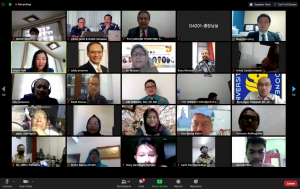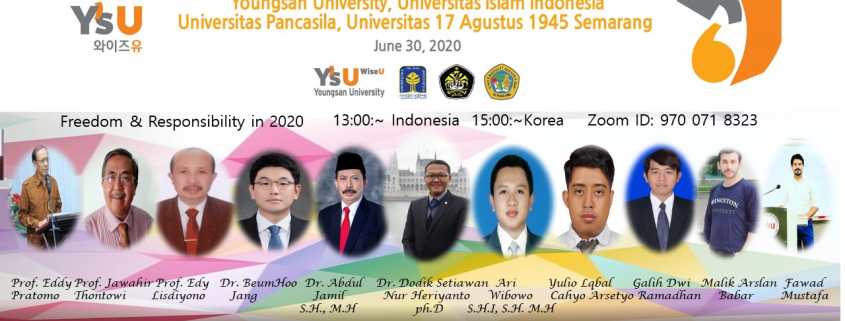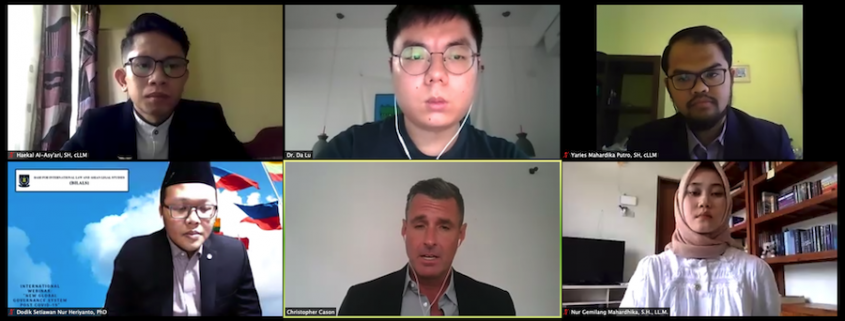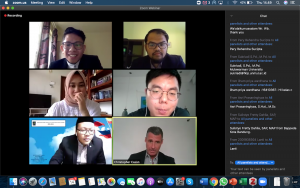Coronavirus Disease 2019 (Covid-19) have an impact to all of activity in this world. The system changed to online not only at the studying process, but also all academic activities were held online. Online system such an alternative to reduce transmission rate of coronavirus.
Youngsan University organize 6th Joint International Conference at June 30, 2020. This activity was usually carried out offline by presenting several speakers who presented their own topics. Committee of this international conference was struggled some way to held this agenda with paid some attention to the situation during this pandemic. This 6th Joint international conference was held online by the title “The 6th Joint International Webinar on Freedom and Responsibilities”.
The webinar was organized by inviting speakers from four different universities who presented their topics online. There were 11 speakers from four participating universities. They were Prof. Jawahir Thontowi, Ari Wibowo SH, S.H.I., M.H., Dr. Abdul Jamil and Dodik Setiawan, Ph.D as speakers from Islamic University of Indonesia. Dr. Beumhoo Jang, Yulio Iqbal, Galih Dwi Ramadhan, Malik Arslan and Fawad Mustafa as representatives from Youngsan University. Prof. Eddy Pratomo from Pancasila University, and Prof. Edy Lisdyono from University of 17 August 1945 Semarang.

Speakers were also came from various groups, they were lecturers and students. Yulio Iqbal and Galih Dwi were student speakers form Faculty of Law who currently taking a joint degree at Youngsan University. Both of them came from Indonesia, exactly they were alumnus from bachelor degree at Islamic University of Indonesia. Malik Arslan and Fawad Mustafa are also students speakers who are studying at Youngsan University, both from Pakistan. They presented the topic very well, look like lecturer speakers who had doctorates and professors.Speakers were presented different topics in this webinar. The combination of topics presented makes the webinar more interesting. Prof. Jawahir Thontowi attended the topic of Freedom of Human Rights and Discrimination which raised the conditions of human rights freedom in Indonesia and international. Dr. Abdul Jamil along with Dodik Setiawan, Ph.D. conveyed issue of the readiness of the justice system related to the existing pandemic under the title “The Readiness of E-Court System in Indonesia Post Covid-19”. Both of them said that e-court system was a good alternative to reduce physical contact between humans, especially in this pandemic condition. Ari Wibowo, S.H., S.H.I., M.H., shared his knowledge about The Restriction on the Right to Hold Opinions and Freedom of Expression in the Indonesian Context, this topics closely related to the recent condition of Indonesia where freedom of opinion was disrupted. Prof. Beumhoo Jang as a representative of Youngsan University brought the topic of Financial Disputes Settlement System in Korea and The U.K. Prof. Eddy Pratomo from Pancasila University firmly related the Legal Prespective: Freedom and Responsibility. Prof. Edy Lisdiyono discussed the Indonesian government’s policies related to the existence of a pandemic, by the title “Indonesian Government Legal Policies to Business Activities During the Corona Virus Pandemics”. The topic presented by the student speakers was interested too, Yulio Iqbal conveyed the Freedom of Academic, The Freedom of Speech of Academician Indonesia Case Study by raising the terror case of the Constitutional Law Professor in Indonesia lately. Galih Dwi Ramadhan discussed freedom in the world of technology with the title of presentation “Freedom and Responsibility of the Internet to Use Digital Image and Software Based on the Copyright Law Prespective”. Malik Arslan came with the topic “Impact of Covid-19 on Pakistan Domestic Industries and Regional Trade”, while Fawas Mustafa related the comparison of existing bank systems in Pakistan and other countries with the title presentation “Pakistan Banking Policies and International Banking Policies”.
All of speakers gave presentations in a very interesting, concise and clear manner so as to make the webinar held smoothly even though it was held online. The webinar was attended by around 50 participants from various different universities. Carried out for approximately two and a half hours, the webinar that was held successfully made the participants let go of each other long since the majority of participants who participated knew each other.







